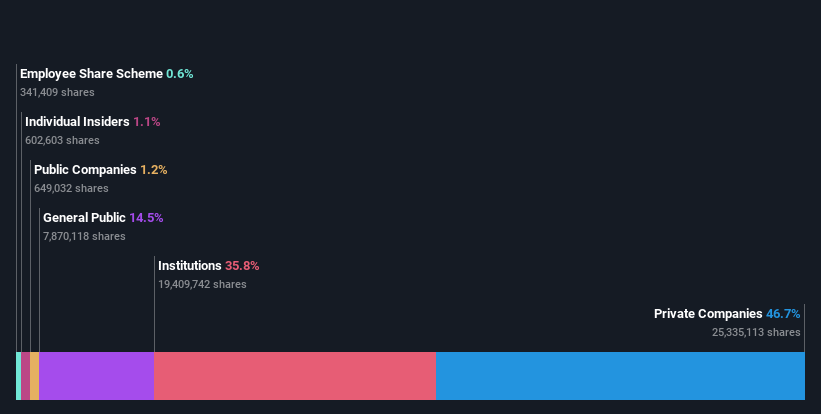Caledonia Investments plc's (LON:CLDN) largest shareholders are private companies with 47% ownership, institutions own 36%
Key Insights
Significant control over Caledonia Investments by private companies implies that the general public has more power to influence management and governance-related decisions
A total of 4 investors have a majority stake in the company with 51% ownership
If you want to know who really controls Caledonia Investments plc (LON:CLDN), then you'll have to look at the makeup of its share registry. With 47% stake, private companies possess the maximum shares in the company. In other words, the group stands to gain the most (or lose the most) from their investment into the company.
And institutions on the other hand have a 36% ownership in the company. Institutions often own shares in more established companies, while it's not unusual to see insiders own a fair bit of smaller companies.
Let's take a closer look to see what the different types of shareholders can tell us about Caledonia Investments.
See our latest analysis for Caledonia Investments
What Does The Institutional Ownership Tell Us About Caledonia Investments?
Many institutions measure their performance against an index that approximates the local market. So they usually pay more attention to companies that are included in major indices.
We can see that Caledonia Investments does have institutional investors; and they hold a good portion of the company's stock. This implies the analysts working for those institutions have looked at the stock and they like it. But just like anyone else, they could be wrong. If multiple institutions change their view on a stock at the same time, you could see the share price drop fast. It's therefore worth looking at Caledonia Investments' earnings history below. Of course, the future is what really matters.
We note that hedge funds don't have a meaningful investment in Caledonia Investments. Looking at our data, we can see that the largest shareholder is Cayzer Trust Company Ltd with 36% of shares outstanding. Meanwhile, the second and third largest shareholders, hold 8.8% and 3.3%, of the shares outstanding, respectively.
Our research also brought to light the fact that roughly 51% of the company is controlled by the top 4 shareholders suggesting that these owners wield significant influence on the business.
While it makes sense to study institutional ownership data for a company, it also makes sense to study analyst sentiments to know which way the wind is blowing. Our information suggests that there isn't any analyst coverage of the stock, so it is probably little known.
Insider Ownership Of Caledonia Investments
The definition of company insiders can be subjective and does vary between jurisdictions. Our data reflects individual insiders, capturing board members at the very least. The company management answer to the board and the latter should represent the interests of shareholders. Notably, sometimes top-level managers are on the board themselves.
Most consider insider ownership a positive because it can indicate the board is well aligned with other shareholders. However, on some occasions too much power is concentrated within this group.
We can see that insiders own shares in Caledonia Investments plc. The insiders have a meaningful stake worth UK£21m. Most would see this as a real positive. It is good to see this level of investment by insiders. You can check here to see if those insiders have been buying recently.
General Public Ownership
The general public, who are usually individual investors, hold a 15% stake in Caledonia Investments. While this size of ownership may not be enough to sway a policy decision in their favour, they can still make a collective impact on company policies.
Private Company Ownership
It seems that Private Companies own 47%, of the Caledonia Investments stock. It's hard to draw any conclusions from this fact alone, so its worth looking into who owns those private companies. Sometimes insiders or other related parties have an interest in shares in a public company through a separate private company.
Next Steps:
While it is well worth considering the different groups that own a company, there are other factors that are even more important.
I like to dive deeper into how a company has performed in the past. You can find historic revenue and earnings in this detailed graph.
Of course this may not be the best stock to buy. So take a peek at this free free list of interesting companies.
NB: Figures in this article are calculated using data from the last twelve months, which refer to the 12-month period ending on the last date of the month the financial statement is dated. This may not be consistent with full year annual report figures.
Have feedback on this article? Concerned about the content? Get in touch with us directly. Alternatively, email editorial-team (at) simplywallst.com.
This article by Simply Wall St is general in nature. We provide commentary based on historical data and analyst forecasts only using an unbiased methodology and our articles are not intended to be financial advice. It does not constitute a recommendation to buy or sell any stock, and does not take account of your objectives, or your financial situation. We aim to bring you long-term focused analysis driven by fundamental data. Note that our analysis may not factor in the latest price-sensitive company announcements or qualitative material. Simply Wall St has no position in any stocks mentioned.
Join A Paid User Research Session
You’ll receive a US$30 Amazon Gift card for 1 hour of your time while helping us build better investing tools for the individual investors like yourself. Sign up here


